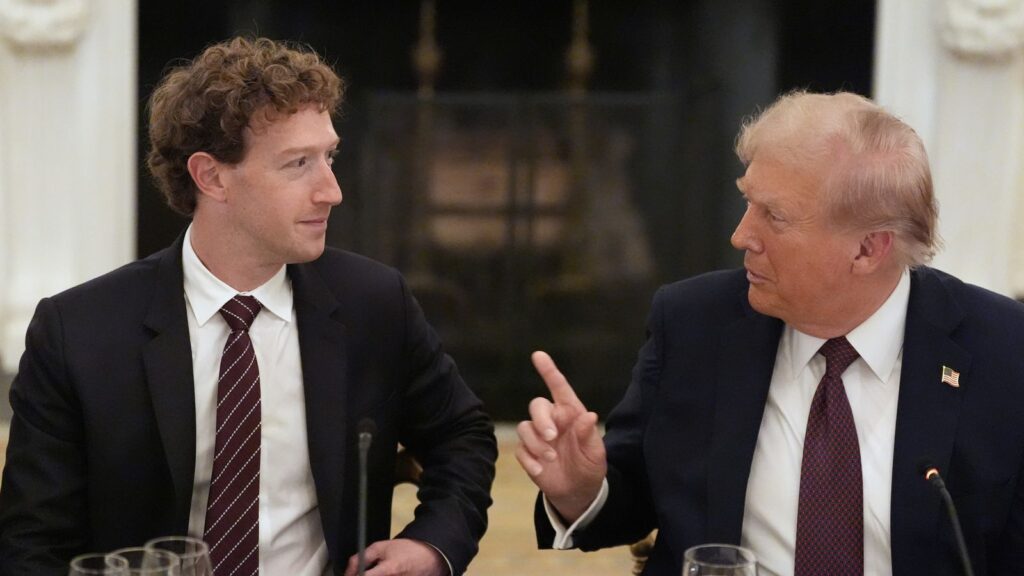
On Thursday, U.S. President Donald Trump hosted a high-profile dinner at the White House with top executives from five of the world’s largest technology companies. The gathering included leaders from Microsoft, Apple, Alphabet (Google), Amazon, and Meta (Facebook), representing multinational giants with a combined market capitalization exceeding the GDP of most countries. The meeting underscored Trump’s commitment to fostering a business-friendly environment, as he pledged to streamline processes for these corporations and received their effusive gratitude in return.
The event, held in a newly-gilded Rococo ballroom, saw Trump promising to “make it a lot easier” for these billionaires to obtain necessary permits. In response, the executives expressed their appreciation for Trump’s pro-business stance. Google co-founder Sergey Brin praised Trump for “supporting our companies instead of fighting with them,” while OpenAI CEO Sam Altman lauded Trump as a “pro-business, pro-innovation president.”
Tech Titans and Their Influence
The dinner was attended by notable figures such as Microsoft CEO Satya Nadella, Apple CEO Tim Cook, Alphabet CEO Sundar Pichai, and Meta CEO Mark Zuckerberg. These leaders represent companies that dominate the technology sector, wielding significant influence over global markets. Their presence at the White House highlighted the close ties between the Trump administration and the tech industry, raising questions about the concentration of power within a small group of corporations.
According to investment strategist Michael Hartnett, the past decade has seen a massive consolidation of monopoly power among these tech giants. The “magnificent seven,” as they are known, have seen their share of the S&P 500 index rise from just over 7% in 2012 to 34% today. Their market capitalization has increased from $1.1 trillion in 2012 to $19 trillion, illustrating their growing dominance.
“What you’ve created this decade is a flow of capital… into anything that has a monopolistic ability to ensure that its sales, its earnings, and, of course, its balance sheets remain dominant.” — Michael Hartnett
Legal and Economic Context
The timing of the dinner was significant, as it followed a favorable court ruling for Google and Apple in a landmark antitrust case. The decision allowed Google to maintain its monopoly on internet search and Apple to continue receiving monopoly rents from Google for making it the default search engine on its devices. Trump congratulated the companies on their legal victory, criticizing his predecessor, Joe Biden, for pursuing the lawsuit.
This legal triumph is part of a broader trend of “good days” for technology monopolies. Since 2012, these companies have experienced exponential growth in market capitalization, driven by their monopolistic practices and the increasing integration of technology into daily life. However, this concentration of power has sparked concerns about the implications for competition and consumer choice.
Implications for the Working Class
The meeting at the White House also highlighted the potential impact of technological advancements on the workforce. Trump endorsed the tech companies’ plans to integrate Artificial Intelligence into various sectors, a move expected to lead to significant economic restructuring. Experts predict that AI-driven automation could result in the loss of up to 800 million jobs by 2030, raising alarms about the future of work and the need for policies to support displaced workers.
As the technology sector continues to expand its influence, the divide between the wealthy elite and the working class grows wider. The power amassed by these tech giants is built on a precarious foundation of financial speculation, with their vast wealth often valued in volatile dollars. This situation underscores the need for a more equitable distribution of resources and opportunities.
“The power and preeminence of American imperialism is not predicated on productive capacity, but by its position in the global economic order.”
Looking Ahead
The close relationship between the Trump administration and the technology oligarchs raises important questions about the future of democracy and economic equality in the United States. As these companies continue to consolidate power, there is a growing call for increased regulation and oversight to ensure a fair and competitive market.
Meanwhile, the working class is poised to play a crucial role in shaping the future. As AI-driven changes threaten to disrupt traditional industries, the need for organized labor movements and social safety nets becomes increasingly urgent. The struggle against the concentration of power in the hands of a few is not just a fight against individual leaders but a broader battle against systemic inequality.
As the nation grapples with these challenges, the voices of workers and advocates for economic justice will be critical in driving meaningful change and ensuring a more inclusive and equitable future for all Americans.







